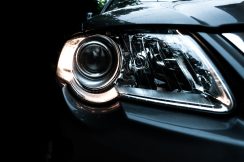There are a lot of choices when it comes to headlights for your car, and two of the most common types are xenon vs halogen. But what’s the difference between them, and which one is better?
Xenon bulbs are more expensive than halogen bulbs, but they also last longer and produce more light. Halogen bulbs are less expensive, but they don’t produce as much light.
What are Halogen Headlight Bulbs?
Halogen headlight bulbs are a type of car lighting system that use halogen gases to produce light. These bulbs are significantly brighter than traditional incandescent bulbs and provide better visibility while driving at night. They also emit a white light, making them appear more modern than their yellow-looking counterparts.
In addition to being brighter, halogen bulbs last longer due to their ability to withstand high temperatures without burning out. This makes them an ideal choice for both safety and financial reasons.
Unlike incandescent bulbs, halogen headlight bulbs contain small amounts of halogen gas in a sealed quartz envelope. When electricity passes through this gas, it produces a bright light with very good color reproduction.
It also produces less heat, meaning that the headlights do not heat up as quickly as traditional lights do. This further increases the life expectancy of the bulb since it does not need to be replaced as often.
How do Halogen Headlight Bulbs Work?
Halogen headlight bulbs use a tungsten filament that is heated to a white hot temperature by an electric current. This heat causes the halogen gas around the filament to vaporize and react with the metal of the filament, recreating new tungsten atoms. These vaporized atoms then coat the filament, extending its life.
Additionally, the intense light produced by the halogen gas improves reflectivity within the headlight housing, resulting in a brighter beam.
What are Xenon Bulbs?
Xenon headlight bulbs are a type of automotive lighting that has become increasingly popular in recent years. Xenon headlight bulbs emit a bright white light that is much more intense than traditional halogen bulbs and can provide up to three times more illumination. This makes them perfect for nighttime driving, ensuring greater visibility and improved safety on the roads.
The xenon bulb itself is composed of two electrodes, an anode and a cathode, which are sealed inside an inert gas such as argon or krypton. The electrodes act like a pair of spark plugs, creating an arc of electricity when activated by a voltage. This arc then heats up the gas, which results in increased illumination for the bulb due to its higher temperature.
Another benefit of xenon headlight bulbs is their longer lifespan compared to traditional halogen lamps. Since they are not subjected to the same level of heat generation, they do not suffer from tungsten evaporation over time and have been known to last upwards of 10 years without requiring any maintenance or replacement. As such, these types of bulbs can save money long-term compared to other automotive lighting options.
Finally, xenon headlights also give off a much whiter light than halogen bulbs, providing better visibility on dark roads and giving drivers the confidence to navigate safely at night. Furthermore, since xenon headlights emit light at wider angles than conventional lamps, they can also increase depth perception drastically at night-time driving speeds; this helps make it easier to spot obstacles and reduce potential danger while out on the road.
How do Xenon Headlight Bulbs Work?
Xenon headlight bulbs work by utilizing the element xenon, which is an inert gas with a low electrical conductivity. This is what makes it particularly suitable for use in automotive applications.
When a current is passed through the headlight bulb, electrons excite the xenon atoms and cause them to create a bright light due to their high intensity discharge. This process is called “arc lighting” and it produces a much brighter and whiter light than halogen bulbs, which use pressurized halogen gas instead of xenon gas.
Xenon headlights also offer greater durability as they are able to withstand higher temperatures without burning out or melting like conventional halogen bulbs do. They also last longer as they are less likely to deteriorate over time due to the more stable nature of the xenon gas that they utilize. Despite their superior performance and sturdier design, however, these bulbs are more expensive than traditional halogen bulbs but can pay off in the long run if you need brighter headlights that won’t burn out quickly or require frequent replacement.
Xenon vs Halogen: What are the Differences?
Halogen and Xenon headlight bulbs offer a range of advantages over each other, making them both popular choices for automobile lighting.
The main difference between halogen and xenon headlight bulbs are:
- Cost
- Light Output
- Power consumption
- Lifespan
- Color temperature
- Visibility
Halogen bulbs are cheaper to produce but generate significantly less light than xenon headlights; they typically only produce around 800 lumens compared to a xenon bulb’s range of 2,000 to 4,000 lumens. This difference in output makes xenon headlights much brighter than halogens, providing a wide beam of light that illuminates the road ahead more effectively. Additionally, xenon bulbs require less energy to power than halogens with up to 40% lower wattage consumption.
Xenon headlight bulbs also have a much longer lifespan than halogen ones, lasting 10 times longer on average (generally from 600 to 1,500 hours) compared to just 200 hours of use for a halogen bulb. The reason for this is because they are made from stronger materials and contain no filament or other moving parts which can easily break when exposed to vibrations while driving over bumpy roads like those in rural areas.
When it comes to aesthetics, xenon headlights have an advantage over halogens as well. They emit a bright white-blue color instead of the yellowish hue generated by halogen bulbs; this allows your vehicle’s front end look sleeker and more modernized despite its age or model year. Moreover, xenon headlight bulbs also improve visibility during night-time driving thanks to their powerful illumination and sharp focus which allows drivers to drive faster and safer with greater confidence on dark roads or highways.
To sum up, the differences between halogen and xenon headlight bulbs include their light output levels (xenons are far brighter), power efficiency (xenons consume less electricity), lifespan (xenons last 10 times longer), and color temperature (xenons appear cooler). All these factors make xenon headlights the preferred choice for most drivers who are looking for better performance compared with what traditional halogen headlights can offer without breaking the bank.
Pros & Cons of Halogen Headlight Bulbs
Pros of Halogen Headlight Bulbs
Halogen headlight bulbs have many advantages that make them a great option for car headlights.
- Affordability: One of the main benefits is their affordability; they are generally much cheaper than LED or HID bulbs, making them an ideal choice for budget-conscious motorists.
- Ease of installation: Additionally, they are easy to find and install, as they fit into standard headlight housings with no modifications needed.
Cons of Halogen Headlight Bulbs
Unfortunately, there are also some drawbacks associated with halogen headlight bulbs.
- Heat: The major downside is that they generate a lot of heat compared to other types of headlights – up to four times more than LED lights. This makes them more prone to burning out quickly and can cause problems if installed incorrectly or without proper ventilation in the housing unit.
- Efficiency: Additionally, as mentioned above, halogen lights tend to be less efficient than LED or HID lights; this means they require more energy from the car battery.
- Less Light Output: Lastly, halogen headlight bulbs produce significantly less light output than LED or HID bulbs; so while they may be brighter than traditional incandescent bulbs, they won’t provide nearly as much illumination when driving on dark roads or during rainstorms. As such, it’s important to consider this factor when choosing headlights for your vehicle – especially if you plan on doing any nighttime driving on a regular basis
Pros & Cons of Xenon Headlight Bulbs
The use of xenon headlight bulbs has become increasingly popular as an upgrade for better lighting performance in automobiles. As with any technology, there are some pros and cons associated with it.
One of the major advantages of xenon headlight bulbs is that they provide a much brighter light than regular halogen headlights. The light produced by these bulbs is almost three times as bright, which allows drivers to see further down the road and make them more visible to other drivers. Xenon headlights also have a longer lifespan than halogen bulbs, lasting up to ten times longer before needing to be replaced.
In addition, xenon headlight bulbs require less power to produce a brighter light than halogen headlights, making them much more energy-efficient. This can help reduce fuel consumption and lower vehicle emissions.
However, there are some drawbacks associated with xenon headlight bulbs as well. One issue is that they tend to be significantly more expensive than traditional halogen headlights due to the technologies used in their manufacture. Additionally, they can take up to 30 seconds after turning on the car before they reach full brightness due to the ballast required for operation.
Finally, while xenon headlights produce a much brighter light than traditional halogen headlights, this can be dangerous if it blinds oncoming traffic or creates glare on wet roads. For this reason, it’s important for drivers using xenon headlight bulbs to maintain their vehicles properly and adjust the angle of their lights regularly so as not to blind other drivers or create dangerous situations on the roads.
Xenon vs Halogen: Which is Better?
Pros of Xenon Headlight Bulbs
When it comes to headlight bulbs, Xenon and Halogen are both popular choices—but which is better? To determine the better bulb, it’s important to look at a few criteria: brightness, efficiency, and cost.
- Light Output: Brightness is arguably the most important factor when choosing a headlight bulb. In this category, Xenon wins out over Halogen. Xenon bulbs have an approximate output that is three times brighter than the light produced by traditional halogen bulbs. This makes them superior for providing visibility and illumination when driving at night.
- Efficiency: In terms of efficiency, Xenon is also the clear winner over Halogen in this area. These types of bulbs use a gas discharge system rather than traditional filament-based systems as found in halogen bulbs. As a result, they require less energy to produce more light compared to their halogen counterparts.
Cons of Xenon Headlight Bulbs
- Cost: When it comes to cost, however, Halogen has the advantage over Xenon bulbs. Generally speaking, you can purchase a halogen bulb for half or even one third the cost of the equivalent xenon bulb depending on make and model of vehicle you own.
Ultimately which type of headlight bulb works best will depend on your individual needs with regards to brightness levels and budget restrictions. For those who want maximum visibility in dark conditions, Xenon headlight bulbs are superior. For those who prioritize cost over everything else then halogens are probably your preferred option.
Convert from Halogen to Xenon HID
If you are looking to upgrade your existing halogen headlights to xenon headlights, there are a few things to consider before making the switch.
- Electronics: Xenon headlights, also known as High Intensity Discharge (HID) headlights, provide more powerful lighting than traditional halogen bulbs, giving you greater visibility while driving. However, they also require special electrical components and installation techniques that you may not have in your current vehicle. You will need a wiring harness specifically designed for use with HID headlights. This harness is included with a new HID conversion kit.
- Bulbs: Once the wiring harness and any other necessary components have been installed, it’s time to replace the existing halogen bulbs with their HID counterparts. It is important to note that Xenon bulbs can be very sensitive, so it’s best practice to install them carefully and avoid touching the glass portion of the bulb whenever possible. Additionally, ensure that the connectors are securely attached in order for these lights to function correctly. Once everything has been installed correctly you should now be able to turn on your brand new xenon headlights and enjoy their superior illumination!
- Fit: It is worth noting that aftermarket xenon headlight kits can be expensive and sometimes may not fit properly into your vehicle as compared with factory-installed options. Before investing in such a kit make sure you know exactly what you’re getting by doing research or talking to an experienced technician who can help guide you through the process of converting from halogen lighting systems over to xenon ones.
Furthermore, if done improperly it could result in poor performance or even damage down the line due to incorrect installation which could end up costing more money in repairs than what was initially spent on upgrading these parts in the first place.
Ultimately though if done correctly and safely then converting from halogen headlights over to xenon ones can give your vehicle much better visibility while driving at night or during inclement weather conditions such as fog or rain storms – allowing for a safer overall driving experience for everyone on the road.
FAQ
How can I know which type of headlight bulb my vehicle has?
The best way to determine which type of headlight bulb your vehicle has is by checking the owner’s manual. Most manufacturers provide detailed information about the bulbs used in their vehicles.
If you don’t have access to the manual, you can also consult the headlight itself for clues. Look for markings on the bulb that indicate the manufacturer, wattage and other specifications that will help narrow down the options for a compatible replacement. Generally, there are three common types of headlight bulbs available: halogen, xenon or LED.
Halogen bulbs are generally considered standard equipment for many cars, as they provide adequate lighting with less power consumption than other types of bulbs.
Xenon bulbs offer a brighter light at higher rates of energy consumption, while LED headlights offer even brighter illumination while using a fraction of the power compared to their halogen counterparts.
When selecting a new headlight bulb, be sure to check compatibility with your car’s electrical system and existing connector systems before purchasing.
Halogen vs Xenon, which burns hotter?
Halogen bulbs burn at temperatures of up to 1,000 degrees Celsius and produce a bright, white light.
Xenon, on the other hand, is a type of gas discharge lamp that produces its own electric arc when electricity passes through it. Xenon bulbs burn at temperatures greater than halogens (up to 3,800 degrees Celsius).
Final Word
When it comes to Xenon vs Halogen, Xenon is superior in terms of light output, color and efficiency. In terms of value, halogen wins. You decide what’s most important to you.




